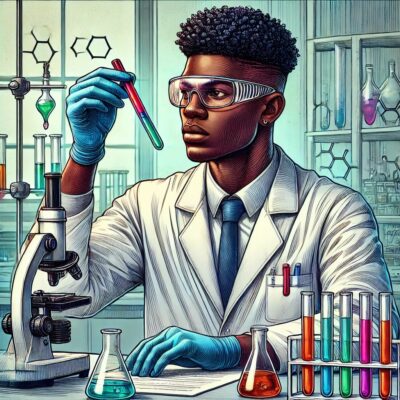Biochemists study the chemical processes and substances within living organisms. Their work contributes to advancements in medicine, agriculture, and environmental science by understanding molecular biology.
What is a typical day in Biochemistry?
– Conducting laboratory experiments to study biological molecules
– Analyzing samples and interpreting chemical reactions in cells
– Writing research papers and preparing reports for publicationCreating reports and visualizations to communicate findings
– Collaborating with multidisciplinary teams on scientific projects
What else might they be expected to do?
– Develop new pharmaceuticals or medical diagnostics
– TMonitor environmental pollutants and their biological effects
– Teach biochemistry courses or mentor junior scientists
What type of training is needed for this career path?
– A Bachelor’s degree in Biochemistry, Biology, or Chemistry is required for entry-level positions.
– A Master’s degree or PhD is advantageous for advanced roles or research positions.
– Training in laboratory techniques and molecular biology tools is critical.
What kind of personality is needed to excel in this career path?
– Detail-oriented, curious, and methodical thinkers excel in this field.
– Big 5 traits: Openness and Conscientiousness are crucial.
– Myers-Briggs types: INTP or ISTJ often align well with this career.
What kind of interests do people in this career path have?
– Fascination with understanding biological processes (Investigative and Realistic traits).
– Passion for solving problems related to health and the environment.
– Interests & Aptitude: Investigative (I), Conventional (C), and Realistic (R).
Are there any innate skills or aptitudes required?
– Strong analytical and problem-solving skills
– Attention to detail for precise experiments
– Ability to work independently and collaboratively
What challenges can I expect to face if I pursue this career path?
– Keeping up with rapidly evolving scientific techniques and discoveries
– Securing research funding for projects
– Managing ethical considerations in biological research
What are the job prospects for this path in Kenya and Africa? What about International prospects for a Kenyan citizen?
– Kenya and Africa: Biochemists are sought after in pharmaceuticals, healthcare, and agriculture, especially as these sectors expand. Opportunities exist in government research institutions and private labs.
– International: There is a global demand for biochemists in biotechnology, academia, and environmental research, with excellent opportunities in countries investing heavily in life sciences.
What should I focus on if I choose to pursue this career?
– Gain expertise in laboratory techniques and data analysis.
– Build a strong foundation in chemistry, biology, and genetics.
– Pursue research projects or internships to gain practical experience.
Which other careers or job roles can I progress to?
– Molecular Biologist
– Clinical Research Scientist
– Pharmaceutical Scientist
– Biotechnologist
– Academic Researcher

